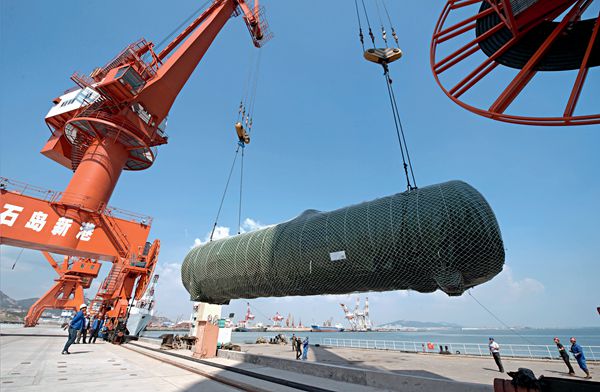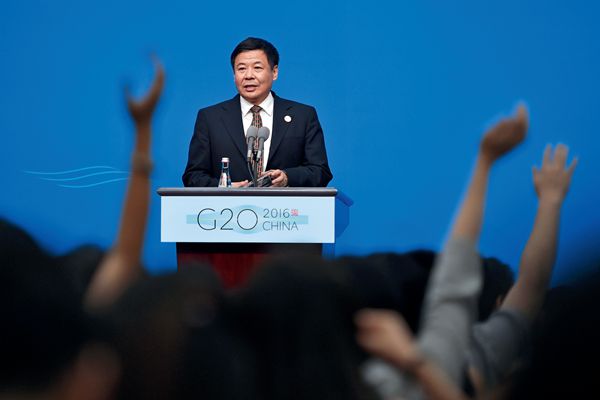By HE YAFEI
By HE YAFEI
NEW changes and development trends in globalization have emerged in recent years which pose serious challenges to global governance. The world economy suffered a huge downturn from which it has not yet recovered, and populism in various forms is becoming widespread. We cannot help but ask what is wrong with the world. Are we seeing a regression from globalization or new progress underway? And what can we do to save global governance?
Let’s start with the major changes that have taken place in globalization and the world situation over the last few decades.
China, as an emerging power, has been developing at a brisk pace with an ever-growing comprehensive strength. China’s growth parallels the rise of a number of other developing countries, which have collectively facilitated the Great Convergence in which developing countries are catching up with developed ones on a scale not seen since the Industrial Revolution. The Great Convergence is dramatically transforming the world’s political and economic environment, moving global governance from a system dominated by developed countries towards a new system co-governed by both developed and developing countries.

Petrochemical tanks are loaded on board at Shidao New Port of Rongcheng, Shandong Province on September 22, 2016. An order facilitated by the Belt and Road Initiative, the tanks will be exported to Pakistan via Tianjin Port.
The old system of global governance could not keep pace with the rapid development of globalization. Since the challenge to Neoliberalism arose, that old system has lost its foundations to the extent of becoming obsolete. Since the 2008 financial crisis, there have been increasing disputes about the principles and regulations of this system, but at the same time, people cannot see where disrupting the system will lead. Against the backdrop of a sluggish world economy, the International Monetary Fund (IMF) lowered its 2016 growth forecast by three percent. Global trade has declined over the past few years; international investment has been decreasing on a large scale; debt crises rumble on; and financial risk continues to rise, prompting the world to turn and look East, with all eyes on China.
At the G20 Summit in Antalya, Turkey in November 2015, Chinese President Xi Jinping pointed out that the previous global economic growth model and the driving force of global governance have lost vitality. The world is calling for a new stimulus, new thoughts and new economic models to aid progress. People all over the world are pondering ways to solve issues like imbalanced economic development and disordered and fragmented global governance. Reforming and perfecting the current system of global governance is now on the agenda.
We cannot ignore the unfortunate adverse effects of globalization. Blue-collar workers in some developed countries are having a hard time finding employment, struggling with low incomes due to adjustments which have taken place in the global production chain: the wealth gap keeps expanding worldwide. There is an anti-globalization or counter-globalization movement currently prevailing in some parts of the world. Its root – populism – is accepted by an increasing number of people and has even influenced the political environment in some major developed countries. Political changes, like Brexit, abnormal phenomena that emerged during the recent U.S. presidential election campaign, and the rise of radical parties in some European countries, have eroded the international community’s support of globalization, and disrupted the smooth operation of international free trade and investment.

China’s Vice Finance Minister Zhu Guangyao speaks at a press conference on G20 and global growth as well as global economic governance in Hangzhou, Zhejiang Province on September 2, 2016.
A deep insight into the new changes, challenges, and development trends in globalization and global governance may help us better understand why the world has been confronted with a series of problems. History fluctuates in waves, rather than moving forward in a linear way. The progress of globalization over the last 20 to 30 years suggested that a new phase was coming, in terms of both globalization and global governance. In this new era, when East and West will join hands, wisdom from the East is expected to contribute much to the world. In other words, global governance calls for wisdom from the East, including China.
The reason? Let’s briefly look back at the history of global governance.
The essence of global governance lies in the formulation and implementation of international institutions and rules. The present system, centered around the United Nations (UN), was established predominantly by the U.S. at the end of WWII and was gradually built up over the decades following the war. With the end of the Cold War came a move away from a polarization in ideology and military alliance, meaning these institutions and rules were widely supported by most powers, including the U.S., Russia, and China.
In the 1990s, Europe first put forward and promoted the idea of global governance in the context of a deeper and broader development of globalization. However, economic globalization has brought problems, like expanding financial crises, an increase in trade friction, ceaseless regional conflicts, scrambles for water resources, and a worsening of climate change. People now realize that in the era of globalization, every country has a stake in its neighbour’s success and relies on each other. It is time for the international community to unite to overcome the challenges we all face. A zero-sum game is just not feasible anymore. In addition, the establishment of international organizations such as the IMF, the World Bank, and the World Trade Organization has facilitated the institutionalization and legalization of global governance, as well as tightening up the rules of the game at the same time.

Henan Yili Steel Construction Engineering is one of the many Chinese enterprises that have launched cooperative projects in Africa stemming from the Belt and Road Initiative.
In the 21st century, the U.S.-advocated unilateralism impacted heavily on the system of global governance. The U.S. quickly realized that it was not easy to be the “world’s police.” After President Barack Obama took office, the U.S. put greater emphasis on its domestic political agenda. Meanwhile, it shifted the focus of its external strategy away from Europe and the Middle East, to Asia. This new focus on Asia and the Pacific has diverted attention from anti-terrorism to the rising of emerging powers.
Meanwhile, emerging economies like China have been highlighting a new system of global governance. The world invites China to share its experience in development and accepts governance based on cooperation between East and West. Standing at the center of the world stage and a new starting point of history, China is expected to make a contribution, helping global governance to be more just, equitable, and reasonable.
A major player in global governance, China successfully hosted the G20 Summit last September. In one sense, China’s development overlaps the reform of the global governance system, which indicates the important role that Chinese wisdom and philosophy play in global governance. President Xi has, on several occasions, put forward the idea of providing global ideas fueled by Chinese wisdom and perceptions.
In which areas of global governance is the country expected to play a leading role?
First, China unswervingly upholds the UN-centered international order and system of global governance. A consensus reached by the international community after WWII, this governance structure has been proved to be generally in line with the common interests of the world. China is not only a beneficiary in this system, but also a supporter, builder, and contributor. It is ill-founded to criticize the country by suggesting that it wishes to damage or destroy the existing structure. As a matter of fact, China has no intention of setting up a new system.
Within the current framework, China continues to facilitate the improvement of international institutions and rules by beefing up such mechanisms as the G20, BRICS, the Shanghai Cooperation Organization, the Asian Infrastructure Investment Bank, the New Development Bank, among many others. It also advocates democracy in international relations, pushing for win-win cooperation and mutual development so as to perfect the global governance system and strive to give developing countries more of a voice.
The world also expects China to come up with innovative ideas and projects to refine the guiding principles of global governance based on the country’s ancient civilization and its fusion of different cultures. To this end, worldwide cultural communication and integration shall be encouraged while “clashes of civilizations” must be abandoned. The Belt and Road Initiative, proposed by President Xi in 2013, has demonstrated the country’s willingness to share its development achievements with all the countries along the route and to help them along the way of progress. Covering various fields, including exchanges on policies, strategy coordination, and people-to-people interactions, the initiative is one of the efforts China has exerted to enhance global governance based on its philosophy of common development. In 2015, when addressing the annual conference of the Bo’ao Forum for Asia, Xi proposed a conference of dialogue among Asian civilizations to be held with the aim of boosting regional cooperation and development.
China advocates peaceful development and hopes to see all countries look beyond, instead of fixing their focus on narrow geopolitics. Relations between major powers must be maintained in the right way. The Thucydides’ trap must be avoided so as to foster a long-term peaceful environment for international politics and security.
With a foundation of peace, development guarantees peace. On the one hand, our world is not able to make any progress without peaceful conditions. On the other, long-term peace cannot be ensured without development. China deeply understands this process, due to its suffering in the 19th and the early 20th centuries.
Moreover, China has put into practice new principles featuring zero conflict, zero confrontation, mutual respect, and win-win cooperation, in building a new mode of major-country relationships with the U.S., which is expected to be adopted in its relations with more countries.
Now that the world has ushered in a new era, globalization has entered a new phase as well. We will certainly see a harmonious world and an ever-growing economy as long as all countries pursue the path of peaceful development.
HE YAFEI is deputy head of the Overseas Chinese Affairs Office of the State Council and a former Deputy Minister of Foreign Affairs.